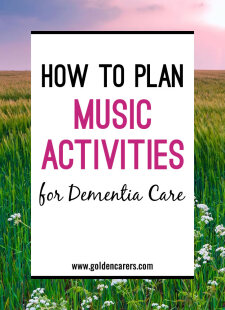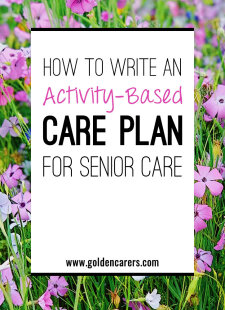10 Spiritual Activities for people with Alzheimer's Disease

Alzheimer's Disease is the most common cause of dementia.
Dementia afflicts one in ten people over 65 years of age and sadly can occur in younger people as well. Related: What is Dementia? Alzheimer's vs Dementia
Religious & Spiritual Needs
Spiritual support for people living with Alzheimer's Disease in nursing homes and other long term care facilities is vital to their well-being and a requisite for the holistic care we strive to achieve.
Leisure & Lifestyle staff can play an important role in assisting residents to maintain their religion or spirituality. Religion and spirituality are closed related but they are not the same.
Spirituality goes beyond what we can see and perceive. It is not an easy term to define as every individual thinks of it in a different way.
Religion on the other hand is an established set of beliefs and traditions that includes ritual, prayers and the worship of a God or deity.
Facilitating the Spiritual and Religious wishes of individuals
Spiritual and religious activities for people with Alzheimer's Disease can profoundly influence their sense of well-being. Activities may include attending Mass, praying or singing together, creating a shrine, or receiving faith counsel from a Minister of religion.
Remember, your role is merely to facilitate the religious or spiritual wishes of residents in consultation with the individual and their relatives. At all times staff should remain mindful of preserving the professional nature of the relationship.
10 Spiritual Activities for People living with Alzheimer's

1. Sacred Music
Music touches us all. Many people with dementia will have memories of hymns they sang as children or at a younger age. Play religious songs and hymns from their era for comfort and spiritual well being. Encourage residents to sing or hum familiar songs.
2. Create an alter or shrine
Buddhists and Hindus need a personal space to pray and make offerings. Talk to the person and make a list of what they would like to create or add to their shrine. Sometimes your required assistance may be bringing fresh flowers from the garden or changing the water on a daily basis.
3. Story-telling
Story-telling encourages positive rapport between staff and residents/families. Show a nice picture (or pictures) to the client and encourage them to make up a story about it. You may use pictures from calendars or coffee-table books. Ask questions to help them along. One of the many advantages of this activity is it that it does not require the person to remember anything.
4. Radio broadcasts or TV Devotions/Mass
Some people are accustomed to hearing religious services on the radio or seeing them on TV. Facilitate access to these services by reminding them of services and assisting with radio tuning or escorting them to the TV set.
5. Nature related Spiritual Care
Nourish the spirit with nature. Take client to:
- Listen & watch birds outdoors
- Visit farm animals
- Pet baby animals
- Sit under a majestic tree
- Visit the shore to watch and listen to the waves
- Watch the stars under the night sky
Related: Outdoor Activities for the Elderly
6. Rest related Spiritual Care
- Slow walk or wheelchair stroll around the garden
- Sitting in silence
- Holding hands
7. Reading poems or passages from the Bible or other books of faith
Rhyming poems may bring happy memories and assist with the recall of important life events. Poetry reading is said to improve mood and concentration in people with Alzheimer’s Disease. Print some poems in large fonts and encourage residents to read to others.
Related: Poetry & Reminiscing for the Elderly
8. Massaging hands/feet/shoulders
The therapeutic benefits of massage for the elderly are well documented. Massage for the elderly involves gentle strokes and kneading. Place a few drops of essential oils such as lavender or geranium in an ounce or 30 mls of carrier oil such as almond or jojoba. Mix and gently apply. It brings pleasure and relieves tension.
Related: Aromatherapy & Massage for the Elderly
9. Retrieval of positive memories
Reminiscing about happy memories encourages the client to resort to long-term memory which may still be remembered with clarity. Use props like: music, photos, gifts, and other keepsakes.
10. Listening to music
The Mayo Clinic suggests that music can have many beneficial effects ranging from reducing feelings of physical pain to enhancing memory. Music genre depends on the individual, as taste varies widely. You may try introducing residents to some classical music that may bring comfort and calm such as Bach’s ‘Goldberg Variations’ or Mozart’s ‘Clarinet Concerto in A’.
Related: The Benefits of Individual Music Activities for the Elderly
We'd love to hear your feedback.
How do you support the spiritual needs of your clients?






our 86 year old Alzheimer's mother, grandma, and great grandma enjoys--what she calls her "Anger Music" it calms her...soothes her...and she falls gently asleep so peacefully. I noticed that her mood has improved through out the day.....and if she is having a difficult day, she'll ask me for her: Angel Music. It is called" scripture lullabies on you tube...that we play on her mid-size smart tv...." it has beautiful soft and gentle music with nature backgrounds, and to be perfectly honest with you--it comforts me too. for a sample listen; https://www.youtube.com/watch?v=Q4Af1zhUPxs
Wow Kathleen
Thank you for sharing this information and the site on YouTube
Great site! FYI, I'm a nondenominational chaplain with a ministry to elders with Alzheimer's and dementia. I've been working on creating free resources for caregivers and family members to meet elders' spiritual needs. I've recently posted dozens of professionally recorded, free sing-along classic hymns and spiritual songs on my website, www.spiritualeldercare.com. Anyone can download these and use them to conduct a sing-along in a residence, create a personalized playlist, or host a nondenominational worship service (agendas are also on my website). Blessings!
Thank you, good article Im an activities co-ordinator in a residentul home in the UK and find that music from their era can change the residents mood very quickly from tears to smiles and song.
Thank you very much for these tips.::)
Hi Christiane - how fantastic of you !!! I wish at times our RN's would do the same, only a couple understand what the activity staff are trying to do and that is work as a team. Oh and I am almost there with implementing this activity from my other comment just by mentioning this activity I have found several more people wanting to join the activity and a potential volunteer too !! Just love this site.
Hi Christiane, how kind of you to help and support your facility’s Recreation & Health staff. After all that’s what teamwork is all about. Congratulations on your team-spirit!
Fantastic Christiane team work and harmony are the best practice for our clients well done as a leader your team and clients are lucky to have you God Bless. Lisa
I am not the activity person but since I have subscribed to golden carers I have been able as an RN to assist the staff in the facility to understand the importance of the role of the activity person in
introducing at clinical meeting some simple activities they can implement when attending to their residents .their attitude has changed and the communication between staff and the activity person is more positive .It has also have a great outcome for the loners .I am so grateful to all the comments and ideas sharing .It has also encourage two staffs to sign for a certificate iv in leisure and activity
Thanks for this article and just in time too. We have a deeply religious, young man with Vascular Dementia just come to live with us and I was trying to find ways to assist this gent. Your ideas will be put to good use, especially reading Bible passages with him and others too !! Which gives me further ideas. I agree with Angela, simple and achievable activities.
Thanks for the fantastic article spirituality is so important to many people,simple activities achieve so much.Angela Wgt NZ
Simple and beautiful activities - Maria, QLD
What a wonderful article thank you for the fantastic ideas
Thank you Lisa, Shirley & Maria.
Thank you so much for these wonderful Activities - Shirley NSW